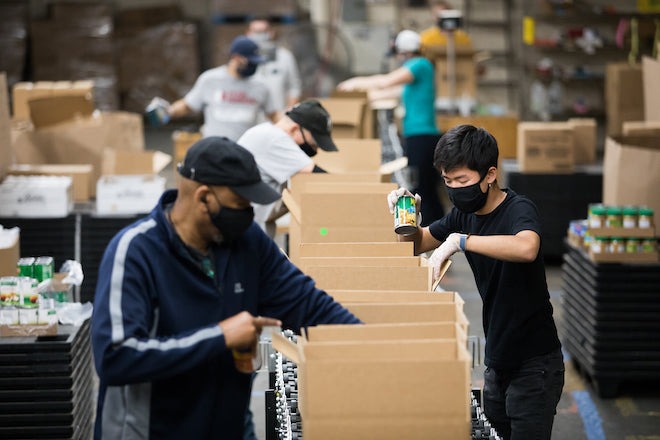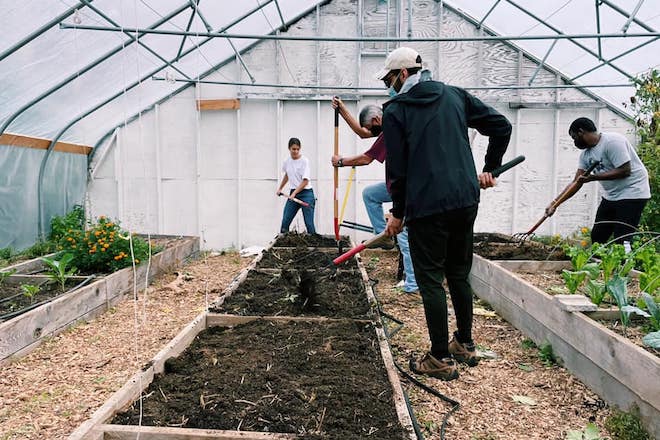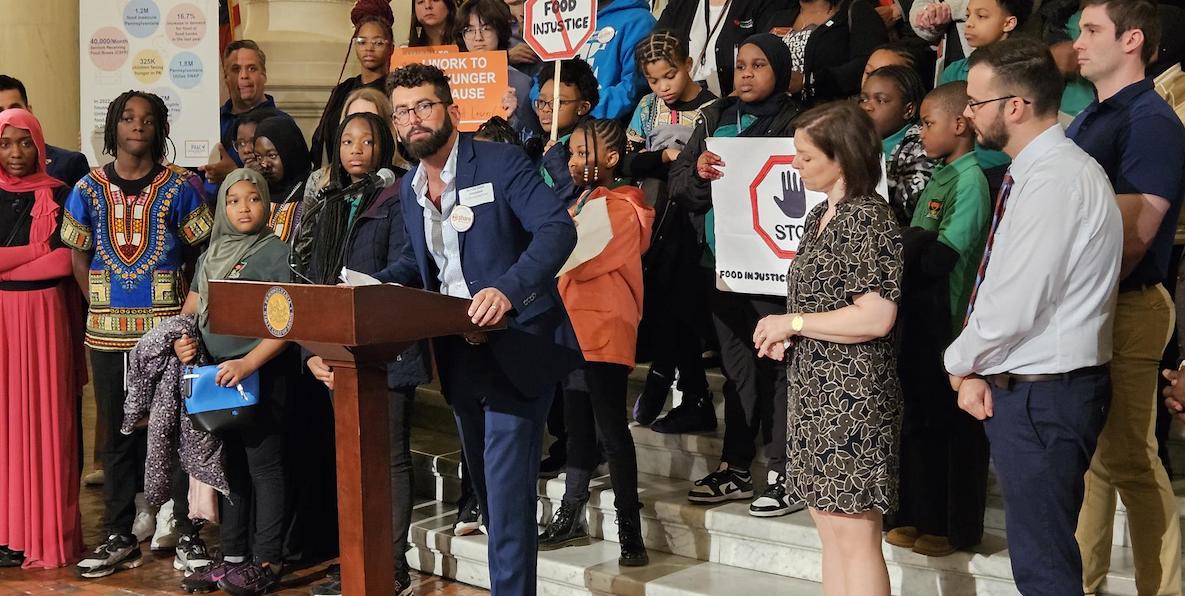George Matysik practically vibrates with passionate energy when he talks about the many hunger-fighting initiatives he has launched with Share Food Program, the non-profit food bank of which he is the executive director. There’s the Senior Box program that provides 32 pounds of free food to more than 7,000 senior citizens each month, a new partnership with DoorDash that makes Share one of the busiest pick-up spots in the world, and an urban farm that donates more than 4,000 pounds of produce each year.
And that’s just a fraction of the many pies (pun intended) that Matysik, who is fanatical about addressing food insecurity, has his fingers in. Under his watch, Share has become the largest hunger relief organization in the Philadelphia region, and one of the largest independent food banks in the nation.
Yet, for someone who loves his job so much, Matysik is equally insistent that he shouldn’t even have it to begin with. “Every food bank is a policy failure in some ways,” he says. “The fact that we even have to do this … is unacceptable.”
From food insecure to food provider
More than 20 percent of Philadelphians live in poverty — a rate which is twice that of the national average — and almost 16 percent go hungry or face food insecurity over the course of a year. Many of those are the most vulnerable Philadelphians, including children and senior citizens. The consequences of hunger cannot be overstated. Not having enough to eat can have debilitating mental and physical consequences such as depression, diabetes, high blood pressure and heart disease.
“For children in particular, hunger can contribute to social and behavioral challenges, lower performance in school, and lead to several adverse health outcomes that persist into adulthood,” says Share Food Chief Communications Officer Jess Bautista. “Food insecurity threatens every fiber of our social infrastructure: our public health, education, economy and development.”
Matysik, who grew up in the Northeast’s Castor Gardens, has first-hand experience with food insecurity. When his parents were temporarily out of work during his freshman and sophomore years of high school, “we relied to some degree on some government support,” Matysik says.
“There is this stigma around accessing these services. And people will say, Oh, these people are lazy. They don’t have jobs.’ [But] normally, people are fully employed and sometimes have two jobs and still need assistance,” he says.

As a student at the University of Pennsylvania, Matysik volunteered with Ed Rendell’s first gubernatorial campaign while working full-time as a school janitor. One early morning, while he was cleaning the office of Kathy Fay (née Sestak), an administrative assistant for a dean, Fay told him she had an idea for his next job.
“‘Hey, I want you to come out to Delaware County. My brother is about to announce that he’s running for Congress,’” Matysik remembers her telling him.
Within weeks, Matysik became Joe Sestak’s campaign manager — helping the candidate win a congressional seat in 2007 and again in 2009. Through Sestak, Matysik met Bill Clark, then executive director of Philabundance, who let Matysik know that Philabundance was looking to start a government affairs department. The job perfectly combined Matysik’s interests in politics and food security, setting him on the career path he remains on today.
Matysik spent seven years with Philabundance, followed by a policy- and data-heavy campaign for a Philadelphia City Council at-large seat in 2015. When he dropped out of the race, he took a job as the executive director of the Philadelphia Parks Alliance, where he was an early advocate for what would become Philadelphia Beverage Tax.
“Every food bank is a policy failure in some ways. The fact that we even have to do this … is unacceptable.” — George Matysik
Matysik so enjoyed his work within the Parks program that “never in a million years” did he think he would leave the role. But then, in 2018, Steveanna Wynn, Share’s executive director since 1989, announced her plans to retire.
Matysik has known of Share Food since he was a student at Mercy Career and Technical High School, which sits just across the street. “Sisters of Mercy are a different breed,” he says. “There’s always the vows that nuns take, and they take an additional vow that’s a vow of service. And so, as a Mercy student, we very much had to serve the community, and it’s a big part of where I learned this stuff,” he says.
Even as a teen, he remembers being wowed by Wynn’s work ethic. “She was on the forklift all day,” Matsyik remembers.
They crossed paths again while Matysik worked at Philabundance and, despite an unserious rivalry between the two organizations, Wynn became a mentor. So, when Wynn announced that she was retiring, Matsyik was convinced no one could run the program as well as she could. “God bless the sucker that tries it,” he remembers thinking, “they’re going to fail miserably.”
He surprised even himself when he sent in a last-minute application for the position and was hired less than two weeks later. “It was the greatest blessing I ever could have asked for,” he says. “It was so hard to leave a job where I felt like I was having a big impact … but I just saw the potential, and I knew.”
Meeting people where it’s needed
Share “purchases, coordinates, stores, packages, distributes and home delivers millions of pounds of food each month,” Bautista says, feeding hundreds of thousands of people every month.
Much of that food is secured through the U.S. Department of Agriculture, and is then distributed via the program’s partner food pantries and their Senior Food Box Program. Additional foods are donated, rescued from supermarkets and restaurants to prevent food waste, or grown at the property’s urban farm. Matysik has exponentially grown the number of services and individuals Share reaches in his five years — along with growing a staff from about 13 to more than 80 people.

Just three months into the job, he received a call from the Pennsylvania Department of Agriculture. The private cold storage business the department had been using to hold and distribute their school lunches was going out of business, and they asked if Share would be willing to take over the lunch program. Matsiyk said yes — even though Share didn’t yet have the cold storage to accommodate the request.
He started building freezers in the back of the warehouse and had them up and running in a few months. Now, more than 300,000 students across 800 schools and 70 school districts get some portion of their lunch through Share each day. They are the only non-profit in the country to manage the national school lunch program.
Since then, their investment in cold storage has only continued to grow. Share acquired an 8,400-square-foot warehouse in Delaware County in 2021, and a 27,000-square-foot warehouse in Montgomery County in 2022. Both warehouses are currently under construction but, when they open, will allow the program to expand its efficiency and reach across the region. (Share already partners with hundreds of community food pantries across the region.) “The need has been rising not only in Philadelphia, but in our surrounding counties,” says Bautista, “and we have to plant our feet where we’re needed.”
The organization recently started working with BookSmiles, a non-profit in Camden County, to deliver books along with the food boxes. In 2021, they merged with Philly Food Rescue, an initiative which saves around 500,000 pounds of food from being thrown out by supermarkets each month.
They also host about 15 school field trips each year at their urban farm, where they help students learn about the causes of and solutions to food insecurity. The farm itself is managed by Share staff and volunteers — it sits right across the parking lot from the program’s Northwest Philly warehouse — who use it to grow produce and herbs that the organization then donates to food pantries, community fridges and other organizations.
One of Share’s most recent initiatives is a solution to a problem that has grown since the pandemic shut down many of the organization’s distribution sites, especially those aimed at senior citizens. In April 2022, Share became a local partner of DoorDash’s Project Dash. The food delivery service now picks up more than 4,500 boxes a month from Share warehouses to drop off to senior citizens.
“We’re trying to build towards that level of service where, regardless of where folks are — whether they’re at school or whether they’re homebound — that we’re able to deliver an exceptional level of service where there is no distinction between the ‘haves’ and the ‘have nots,’” Matsyik says. “[We want to] change some of the national narrative around what we can and should expect out of our social service organizations in this country.”
Food is not enough
Already high levels of food insecurity have only gotten worse since the pandemic. Though many life-sustaining programs such as stimulus checks, extended unemployment, and extended SNAP benefits were added by the U.S. government to help individuals in 2020, subsequent program cuts have been devastating. Share has seen a “98 percent increase in need” since 2022, says Bautista.
These cuts have impacted both the people Share serves and the non-profit itself. They’ve had to use private donations to make up for the gap created from receiving fewer government resources.
“Food insecurity threatens every fiber of our social infrastructure: our public health, education, economy and development.” — Jess Bautista
That has propelled Matysik back into the world of political advocacy. In early April, Share sent more than 30 advocates to Harrisburg for the Pennsylvania Hunger Action Coalition rally. Matysik joined other members of Share and Pennsylvania Hunger Action Coalition in meeting with State Rep. Jose Giral, and State Senators Nikil Saval and Tracy Pennycuick. They also left informational handouts at the offices of 41 lawmakers who sit on committees related to agriculture, education, appropriations and youth.
Matysik was the final speaker on the steps of the Capitol building. Behind him, children held signs reading, “stop food injustice in Pennsylvania.” He spoke about how necessary the State Food Purchase Program was to keep Share running in the beginning of the pandemic. “Without that program, and without the many critical programs we are advocating for here today,” he says, “we would’ve had a serious crisis on our hands.”
Despite the success of the rally, Matysik says, “The advocacy can’t end there. We can’t just be a band-aid. We need funding for the relief today, but ultimately we need to be fighting so that these systems don’t need to exist tomorrow.” That goes beyond the temporary solution of bringing food to people’s doors. “That is [advocating for] things like increasing the minimum wage,” Matysik says.
Harrisburg was the first time that Share dove into advocacy work on such a large and public scale — but it will not be the last. Matysik promises more and bigger efforts in the coming months and year — not just to feed people now, but to ensure they can feed themselves in future.
“There’s no doubt there’s been tremendous growth … but we know that there’s still a lot of work ahead of us,” he says. “We’re ready for that work.”
Correction: A previous version of this article misstated Jess Bautista’s title. It is Chief Communications Officer. It also misstated how the produce grown on the Share farm is used; it is donated to food banks and other organizations.
![]() MORE GOOD FOOD FROM THE CITIZEN
MORE GOOD FOOD FROM THE CITIZEN




